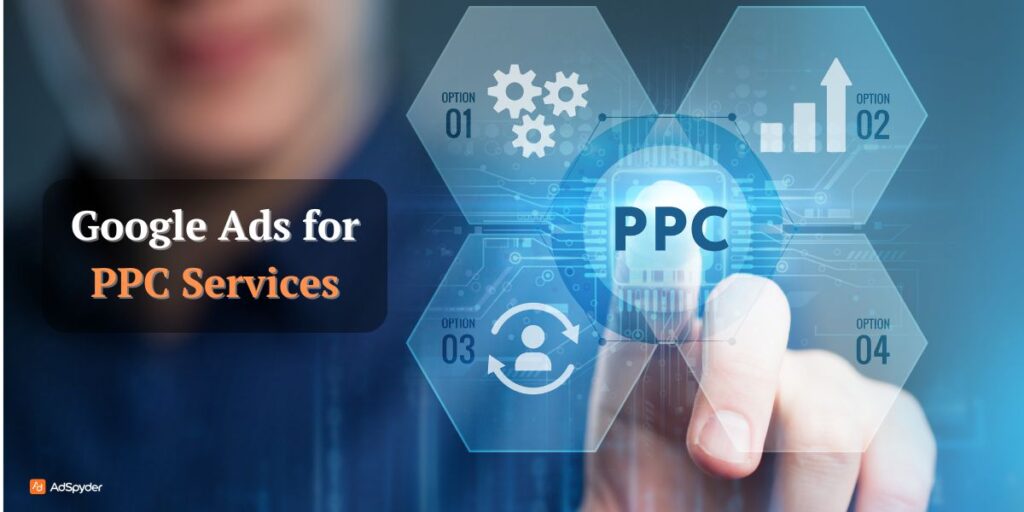Digital marketing businesses currently require expert PPC service delivery precisely due to strong competition in online advertising. Every business of any size understands the utility of targeted advertisement for reaching its target customer base. Using Google Ads for client campaign management represents only one half of its power for PPC service providers because it functions as a highly effective tool for attracting new clients. This complete guide explains Google Ads for PPC Services alongside valuable methods to succeed as a leading PPC provider.
Ready to Elevate your Marketing Strategy?
Why Google Ads Are Essential for PPC Service Providers
Google Ads provides dual functionality to PPC management agencies since it functions both as a client platform and as a platform for client acquisition. Here’s why it’s crucial:
- Showcase Expertise: Your agency proves its PPC management excellence by running professional Google Ads campaigns. A straightforward method enables you to display your competence level to potential clients seeking your services.
- Targeted Reach: The advertising method enables businesses to connect with organizations which are currently investigating PPC management or PPC services or related keyword searches. Your advertising runs toward markets matching specific industries and locations and client business sizes and additional segments of importance.
- Generate Qualified Leads: The platform delivers potential customers to specific website destinations for them to discover your services and start consultation proceedings.
- Build Brand Awareness: Promote your agency to become a well-known PPC services provider by effectively establishing your trustworthiness to customers.
- Control Your Budget: Your advertising spend happens only when someone clicks on your advertisement. Use ROI tracking to enhance campaign performance and achieve maximum efficiency.
- Measurable Results: Google Ads generates quantitative analytics which provides performance tracking of impressions together with clicks as well as conversions and cost per acquisition data. Use data analytics to enhance the performance of your marketing efforts.
- Compete Effectively: Designed PPC campaigns through Google Ads to help established agencies control their market position and maintain top slots even against fierce market competition.
Related – Retargeting Ads for Marketing Firms
Understanding Your Target Audience
You need to identify your perfect customer profile before establishing any Google Ads campaign. The services of PPC address different types of businesses that require specific marketing objectives combined with their individual requirements. Consider these key segments:
- Small and Medium-Sized Businesses (SMBs): SMBs generally choose affordable managed PPC solutions that help them increase their website traffic while generating sales.
- E-commerce Businesses: To optimise their online revenue from Google Shopping campaigns and conversion and retargeting processes, e-commerce businesses need specialized PPC services.
- Startups: New companies should construct comprehensive PPC advertisements to create market recognition along with initial market penetration.
- Large Corporations: Large companies need complex PPC strategies combined with support solutions that are fit for large-scale promotional initiatives.
- Specific Industries: You should concentrate on specific business sectors which align with your core industry expertise such as healthcare but also finance and technology fields.
For each segment, consider
- Marketing Challenges: Which obstacles form the major marketing hurdles for these organisations?
- Budget and Goals: The marketing budget stands as a question while the company objectives function as specific marketing targets.
- Decision-Making Process: Identify all personnel responsible for determining which PPC agency receives selection for service.
- Information Sources: Where do they get their information about PPC agencies?
Advertising success becomes inevitable for Google Ads campaigns when you develop complete audience personas for each target segment.
Explore Now – Brand Awareness Ads for Digital Marketing Agencies
Keyword Research and Targeting
Your Google Ads campaign requires foundation research to use effective keywords successfully. Before targeting potential clients for PPC services, you must learn the specific terms they utilise to find such advertising help.
Brainstorming
Create an ideation list containing PPC management terminology along with PPC service terms as well as Google Ads management, paid search management, online advertising management, PPC agency and Google Ads expert and PPC consultant keywords. The ways that future prospects look for details about PPC services should be considered while brainstorming. Research alternative ways people choose to express their search queries through different phrasings and detect both regular misspellings and specific terms within PPC management (“PPC management for e-commerce businesses” or “Google Ads consultant for healthcare”).
Keyword Research Tools
The keyword research tools composed of Google Keyword Planner Ahrefs and SEMrush, and Moz Keyword Explorer provide capabilities to develop your list by discovering high-volume, low-competition keyword choices. Your keyword selection process should focus on volume statistics and challenge levels whileanalysingg competitive environment. You should examine keywords that demonstrate buying intention in the market.
Match Types
To control what keywords trigger your ads you need to understand broad, phrase and exact match types then strategically apply them. Multiple match types tend to create the most effective keyword strategy. Watch your usage of broad match since it may drive your ads toward irrelevant searches leading to budgetary waste.
Negative Keywords
Identify and avoid negative keywords because they activate your ads for irrelevant searches which yield unqualified leads. The strategy helps marketers improve their audience selection processes and prevent useless budget expenditure. When your agency does not manage social media ads or Facebook ads then use these terms as negative keywords.
Location Targeting
Your advertising campaign should direct ads towards geographic areas which align with the client base you aim to reach. Local businesses along with agencies who serve particular regions should implement this strategy.
Demographic Targeting
Address specific client segments by employing demographic targeting through features that enable managing audience criteria based on age, gender, income and company size together with industry specifications.
Audience Targeting (In-Market, Affinity, Custom Intent)
Leverage audience targeting options to reach users who are in-market for PPC services, have an affinity for online marketing or business growth or have shown custom intent by searching for related terms.
Remarketing
Target users who have previously visited your website or interacted with your online content. Remind them of your PPC services and encourage them to contact you.
Crafting Compelling Ad Creatives
The ad creative establishes the initial contact for prospects who are looking at your PPC services. The ad creative requires information that stands out while being artistically designed and persuasive.
Highlight Key Selling Points
Focus on presenting key differentiators of your PPC services. Does your service stand out in certain industries because you possess proprietary bidding strategies combined with a history of successful campaigns and commitment to showing clients all data points? Showcase these differentiators in your ad copy.
Use Strong Headlines and Copy
The messages you want readers to see should be direct and pointed statements that specifically address the audience’s requirements. Your business language needs to connect with your prospective clientele while making them feel positive about the advantages of your delivery services.
Include a Clear Call to Action
Tell potential clients what you want them to do. Include a clear call to action, such as “Get a Free PPC Audit,” “Request a Consultation,” “Download Our Case Study,” or “Contact Us Today.”
Showcase Results and Testimonials
Adding testimonies and quantified outcomes from contented customers establishes your business credibility and wins the trust of audiences. The noteworthy statements which drive impact include “X% conversion boost” and “Y% return on investment accomplishments with clients.”
Use Ad Extensions
PPC services need a combination of ad extensions that include sitelinks, callouts and structured snippets to present supplemental information and guide users toward crucial website pages.
Mobile Optimization
The user experience of mobile audiences requires ads alongside landing pages to be fully mobile-responsive. A large number of business owners along with marketers use mobile devices for service research.
A/B Testing
The process of A/B Testing means repeating creative tests on PPC ads to identify which ones generate the optimal results. Gauging different headings alongside text content and image elements, along with instance prompts, helps you enhance your campaign performance.
Campaign Structure and Organization
It is probably the most crucial thing. A well-structured campaign is absolutely essential for effective management and optimization.
- Organized Campaigns: A campaign organization framework should consist of target audience classifications like “SMBs,” “E-commerce,” “Startups” and industry or product-focused groups like “Healthcare PPC,” “Finance PPC” and service-type ad groups such as “Google Shopping Campaigns,” “Remarketing Campaigns.” Organized targeting makes it possible for better allocation of messaging and budgets.
- Ad Groups: A single ad group should contain related keywords and advertisement materials. Each ad group within the “SMBs” campaign includes keywords and creatives for local PPC management and small business Google Ads and affordable PPC services.
- Targeting at the Appropriate Level: The most relevant audience will receive your ads when targeting options such as demographics and audience location and other criteria are applied to the right campaign or ad group level.Select precise targeting choices at the ad group level to show PPC services to relevant audience interests and specific demographics.
- Granular Targeting: Use granular targeting options within ad groups to reach specific interests or demographics that are relevant to the PPC services you’re promoting.
Recommended For You – Local Advertising for Ad Agencies
Budgeting and Bidding Strategies
For you to reach maximum Return on Investment (ROI) you need to establish realistic budget limits together with appropriate bidding systems.
- Budget Allocation: The budget should spread evenly across marketing campaigns by assessing which target groups and service lines produce the best return on investment. Registered prices along with competitive market factors should direct the decision about allocating greater budget allocations. Higher-value clients or more competitive industries may warrant a larger budget.
- Bidding Strategies: Select a bidding tactic that matches your campaign targets among your available options. The most successful strategy for PPC agencies involves optimizing conversions or establishing target CPA goals (cost per acquisition). Your main goal is to sign up profitable PPC clients through investment in cost-efficient acquisition methods. Maximize Clicks should be your selection when running brand awareness campaigns.
- Cost Per Acquisition (CPA) Goals: Establish Cost Per Acquisition (CPA) goals that derive from the calculated values of client lifetime value (CLTV) and desired acquisition costs. Monitor your CPA value closely to make necessary changes to your bidding approach and targeting parameters.
- Regular Monitoring and Optimization: Continuous monitoring must encompass campaign performance evaluation for adjusting bids with targeting and ad creative elements. Maximum ROI requires periodic adjustments to your advertisements.
Measuring Success and ROI for Google Ads for PPC Services
The assessment of Google Ads success enables you to understand marketing investments better and supports clear decision-making about future advertising strategies.
- Key Performance Indicators (KPIs): Identify the key metrics that align with your campaign goals. Common KPIs for PPC agencies include:
- Impressions: The number of times your ad was displayed to your viewers.
- Clicks: The total number of user clicks on your ad represents ‘Clicks’.
- Click-Through Rate (CTR): Click-Through Rate (CTR) indicates how often impressions turn into actual clicks.
- Conversions: The number of desired actions users take after clicking on your ad (e.g., contact form submissions, consultation requests, phone calls).
- Conversion Rate: The ratio between clicks which led to conversion defines the Conversion Rate.
- Cost Per Click (CPC): Your average payment to receive a single ad click amounts to the Cost Per Click (CPC).
- Cost Per Lead (CPL): Your average payment for acquiring a single lead amounts to Cost Per Lead (CPL).
- Cost Per Acquisition (CPA): CPA represents the regular expense of acquiring a new client.
- Return on Ad Spend (ROAS): Return on Ad Spend (ROAS) represents the total revenue obtained from every dollar spent on advertisement campaigns.
- Client Lifetime Value (CLTV): An agency running PPC campaigns should estimate their clients’ complete revenue throughout their agency relationship in Client Lifetime Value (CLTV).
- Analytics Tools: Google Analytics allows businesses to monitor website visitor activities, including engagements and conversion data, which originates from their PPC initiatives. Google Ads provides conversion tracking functions that you should use along with its reporting tools.
- Attribution Modeling: With attribution modelling, you can understand conversion causes by studying various steps customers take before purchasing. This tool enables you to enhance your efforts by optimizing your advertising strategies while correctly distributing your budget.
Integrating Google Ads with Your Overall Marketing Strategy
Successful Google Ads performance occurs when your marketing strategy aligns with your Google Ads campaigns.
- Content Marketing Synergy: Utilize your Google Ads campaigns to market significant PPC and digital marketing content which includes posts blogs articles case studies white papers. The content promotes site traffic while establishing your agency as a prominent actor in the field.
- Search Engine Optimization (SEO) Alignment: Coordinate your Google Ads campaigns with your SEO efforts. Your PPC services need target keywords that match your offer at the same time your website needs optimization for these selected search terms. Target keywords that are relevant to your PPC services and ensure your website is optimized for those terms.
- Social Media Promotion: Your Google Ads campaigns should receive exposure through your social media pages because this action enlarges reach towards new audience segments.
- Email Marketing Integration: The integration of email marketing with your Google Ad campaigns enables you to acquire leads which you can then develop through specific email communication sequences.
Best Practices for Google Ads for PPC Services
Some of the best practices that could help PPC services in better managing their Google Ads are as follows:
- Focus on Targeted Reach: Reach business entities that specifically seek to hire PPC agencies through your promotional efforts.
- Highlight Key Selling Points: Accentuate your PPC service special features along with their proven effectiveness in your marketing messages.
- Use Strong Calls to Action: Make it easy for potential clients to contact you.
- Showcase Results and Testimonials: Display your achievements coupled with client reviews to establish trust as well as credibility.
- Mobile Optimization is Crucial: You must optimise both ads and landing pages for mobile devices because these platforms lead to success.
- Track Your Results and Make Adjustments: You should track your campaign results and modify your approach to achieve better performance results.
- A/B Test Everything: Carry out A/B testing to evaluate which ad elements create the best results.
Common Mistakes to Avoid
There are a few mistakes that occur commonly, which could be avoided by keeping these in mind.
- Not Targeting the Right Keywords: Your budget gets wasted because your selected keywords do not address the correct searches.
- Using Generic Ad Creatives: Failing to connect with potential clients on their specific PPC needs.
- Poor Landing Page Experience: A confusing or unconvincing landing page can deter conversions.
- Not Tracking Results: You should measure your campaign success because failure to track results produces ineffective outcomes.
- Not A/B Testing: Your advertising efforts suffer from inadequate testing because you skip A/B testing.
- Ignoring Mobile Optimization: Too many business owners, along with marketers conduct research through mobile devices about their services.
Must See: Facebook Ads for Advertising Agencies
The Future of Google Ads for PPC Services
Future Google Ads platform development will focus on enhancing individualized experiences and artificial intelligence campaign enhancements as well as better cooperation with other marketing solutions. PPC service providers will intensify their efforts to prove PPC value to clients by leveraging data analytics in their reports.
Conclusion
Google Ads for PPC Services is a powerful platform for PPC agencies to connect with potential clients, showcase their expertise, and drive new business. By implementing the strategies and best practices outlined in this guide, you can create effective campaigns that deliver measurable results. Remember that ongoing optimization, creative experimentation, and a client-centric approach are crucial for maximizing your ROI and achieving your business goals.
FAQs for Google Ads for PPC Services
Why are Google Ads essential for PPC service providers?
A PPC advertising strategy allows businesses to display their expertise while reaching their target market through lead generation activities, brand recognition development, budget control features and result measurement alongside strong competitiveness.
How do I identify my target audience?
PPC service providers need to focus on SMBs along with e-commerce businesses and startups as well as large corporations and distinct industrial sectors.
What are the key elements of keyword research?
The key elements of keyword research include brainstorming with strategic tools alongside different keyword matching types, plus the implementation of negative keywords and location-based and demographic and audience-focused targeting methods as well as optional remarketing strategies.
What makes compelling ad creatives?
Highlight selling points, strong headlines/copy, clear call to action, showcase results/testimonials, ad extensions, mobile optimization, A/B testing.
How should I structure my campaigns?
Organized campaigns (by audience/industry/service), ad groups (related keywords/ads), targeting at the appropriate level, granular targeting.
What are effective bidding strategies?
Maximize conversions or target CPA, and consider “Maximize Clicks” for brand awareness.
How do I measure success and ROI?
Track impressions, reach, clicks, CTR, conversions, conversion rate, CPC, CPL, CPA, ROAS, CLTV, and use analytics tools.




